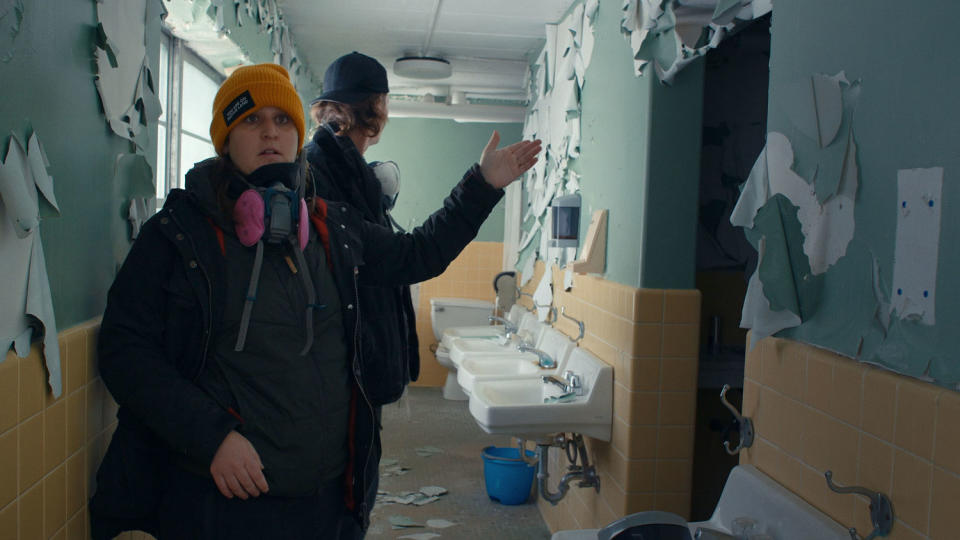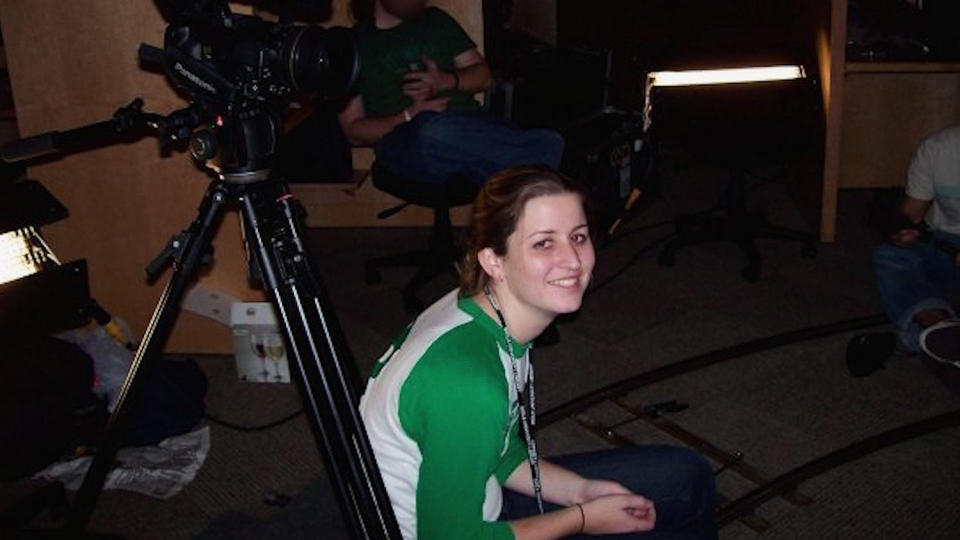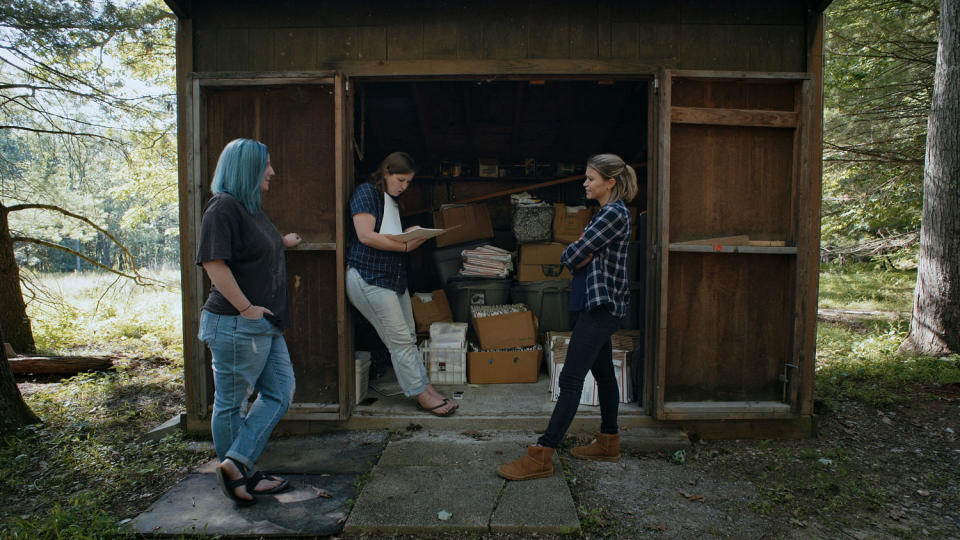'The Program' director on exposing, and surviving, the troubled teen industry
For some, “The Program: Cons, Cults and Kidnapping” is entertainment. For director Katherine Kubler and her former classmates, though, it's the story of their lives.
In the three-part series, director Kubler and former classmates shattering experiences at The Academy at Ivy Ridge. Visiting the now-shuttered Ogdensburg, New York institution, the alums recount what happened those rooms, including alleged assaults by the staff. One staff member interviewed for the documentary, who quit after one month on the job, said the students were "treated like prisoners."
The Academy at Ivy Ridge was one of many residential programs located around the U.S. and the world that comprise the “troubled teen industry.”
Kubler was sent to Ivy Ridge after she was kicked out of boarding school in 2004 for being found with alcohol. Instead of her father picking her up, two strangers handcuffed Kubler and drove her to the institution in upstate New York.
The documentary's title refers to "the program" that students like Kubler had to get through to graduate, accruing points (and losing them).
"I was generally a good kid. I would follow the rules. I wasn’t trying to actively rebel against the program. I was trying to follow the rules and do as best as I could. To do that in the program, you literally just had to be a robot," Kubler tells TODAY.com.

Kubler included other survivors in the documentary, including some who "actively resisted the program," to show the breadth of experiences of life under the program.
"Just because those abuses didn’t personally happen to me, I needed to make those injustices and abuses aware," Kubler says.
At Ivy Ridge, students were isolated from their families and actively discouraged from forming relationships with each other, former students said in the documentary. Many, like Kubler, struggled with their parents' decision to send them to the school. Kubler laughs bitterly in a scene that her dad paid upward of 60 thousand dollars to "give her PTSD."
Kubler spent 15 months at Ivy Ridge before her father, Ken Daniel, pulled her from the program early. Kubler filmed their first meeting after years of estrangement. “It was terrible,” he says in the documentary. “I didn’t know they wee going to do to you.”
Kubler says in the documentary, “It’s hard, because he’s a victim in a lot of ways. He fell for this scheme. It’s embarrassing.”
He also apologizes in the documentary and, in an email statement issued to TODAY.com, expressed his feelings in hindsight.
"I empathize with other parents (especially in blended families) who worry about their kids acting out from domestic stress," his statement reads. "I acted from fear that Katherine was at risk. I know that I acted out of good, but misinformed, intentions following other parent recommendations from families who thought, at the time, their children were being helped by the Program."
"I will always have deep regrets for that decision (especially following the recommendation to have 'transporters' escort her there.) But am so glad that I learned enough about the Program to pull her out early, and only regret that it took me over a year to figure out what was really going on," his statement continued.
Below, Kubler shares more about the making of "The Program" with TODAY.com, including where her relationship with her dad stands now.
Can you given an example of life under the program?
The thing that I always got in trouble for at the program was this correction that they called “neglect.” It was a 25-point correction. It essentially was like two days’ worth of points. You’d get a neglect if you forgot something.
One rule in the program was that you had to carry a water bottle everywhere. The water was gross (at Ivy Ridge). It was yellow and smelled like toilet water, and it was disgusting. I’d always lose my water bottle. So I’d get neglect, and I would add two more days to my sentence. Now, if you got three of the same correction in one week, you’d get something called a “trend.” That’s a 50-point correction. So that’s four days added to your sentence.

If you know anything about stress and anxiety, it creates more forgetfulness. Making this worse was the fact that they took me off of my ADHD medicine. There was one week where I had so many neglects that I got a “trend of trends of neglect.” I can’t even do the math to figure out how much more time that added to my sentence to stay in the program just because I couldn’t keep track of my water bottle.
That’s how they kept me there longer and got more money out of my parents — stupid corrections like that.
You were pulled from the program before graduation. What was life like for you once you returned home?
My dad pulled me from the program a few months before I turned 18. As a result, I had this fear hanging over my head that I was going to be sent back if I acted out. So, for those few months before I was 18, I was still a robot, just still living in the program but in my own home.
The day I turned 18, I moved out of the house, bought a car off Craigslist for 350 bucks, got a job delivering pizzas and got an apartment with a friend from the program. I was like, “Goodbye.”
When did you first begin to feel safe enough to confront your dad about your experiences?
I had a very dark year after the program, just trying to readjust to society, learn how to live, and try to heal. My dad was trying to like to make amends, but I was like, "No, you abandoned me. Like, it’s up."
Honestly, before he had pulled me, I was already like, “The day I turn 18, I’m out of here. I’m never talking to this guy again because he abandoned me.” But then, after a year, all of my friends started going off to college. I was like, “I don’t want to miss out on that. I don’t want to let the program derail my life more than it already has.”
So, I patched things up enough with my dad so that he would pay for film school, because I wanted a real education. I felt like I was owed that. I moved out to L.A., and it was nice because it was 3000 miles away. I was able to carry on this kind of superficial relationship with my dad. But don’t get me wrong, I yelled at him many times. It was very frustrating just trying to get him to realize what he put me through.
What was the process of getting your father to understand the ramifications of sending you to Ivy Ridge?

It was a long journey. No parent wants to admit that they were conned or admit that their child was abused. They also really have no framework to understand that places like this could actually exist. So it wasn’t until 2018 when my complex PTSD really started catching up with me, that I cut off contact with him. I needed to figure out what was going on because I had to undo all this programming and brainwashing and really just figure out, like, “What’s going on with my body? Why am I still hurting from all this?”
The documentary picks up when I first started resuming contact with my dad, and that was by putting him through his own version of the program of limiting communication and making him earn privileges to move up from going to emails to then a 15-minute phone call once a month to be able to visit me eventually.
In his email to TODAY.com, Daniel addressed what he would tell people who are judgmental of his decision.
"Try to imagine being in my shoes, having to withdraw her from a really good boarding school (that I had just put her in to give her some space from blended family pressures)," he wrote. "And to have to make a quick decision in the middle of the Spring semester to get her in a new school without losing the academic term. So I just followed the recommendations of other parents, who also would learn much later of their own mistake."
What’s your relationship like with your stepmother now?
She is still married to my dad. I have no contact with her, and I won’t.
Daniel commented on his wife's role in getting Kubler into the program, writing to TODAY.com, "I am so proud of Katherine. My wife Jane (Katherine’s step-mother) is also proud of her, despite seeing herself behaving badly in the first episode and so regrets her part in making Katherine’s early life difficult."
Do you have plans to revisit the subject with another documentary?
My original intention was to move on with my life. I wanted to get the story out and be done and move on.
Going into this, I had two simultaneous fears. One was going public and people seeing it. The other was putting it out there and not even making a blip in the radar because it’s an important issue, and people need to know about it. I will say there’s no shortage of stories, and there’s this rabbit hole to go down. I’d love to see more of these stories being told. We’ll see how things play out.
This article was originally published on TODAY.com

